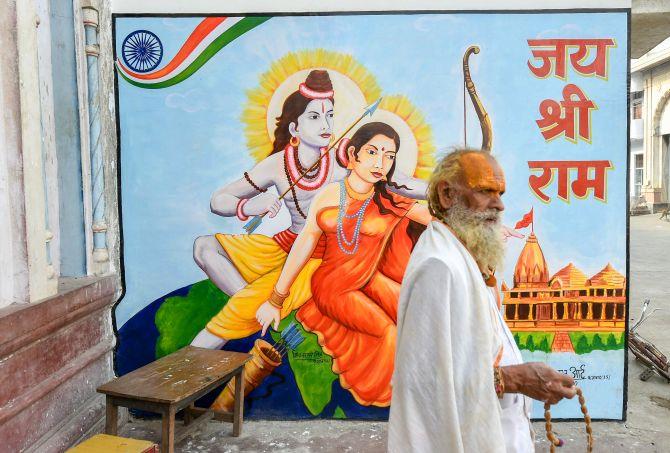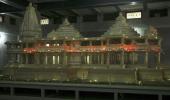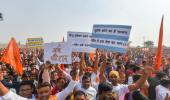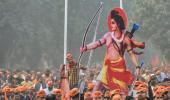Muslim parties, sans the Sunni Waqf Board, made clear Friday that they do not accept the Supreme Court-appointed mediation panel's proposal on purported settlement to resolve the Ayodhya land dispute and expressed surprise over reports suggesting that the Board was willing to withdraw the claim on the site of the mosque.

The mediation panel headed by former apex court judge Justice F M I Kallifulla had filed a report in a sealed cover in the Supreme Court indicating a 'sort of a settlement' between the Hindu and the Muslim parties in which the Waqf Board agreed to give up its claim over 2.77 acre disputed land at the Ram Janmbhoomi-Babri masjid site if certain conditions are fulfilled.
'We are taken aback by the media reports attributed by Shahid Rizvi, advocate on record that Uttar Pradesh Sunni Central Waqf Board was willing to withdraw the claim on site of the Babri Masjid,' Eijaz Maqbool, counsel for legal representatives of key Muslim litigants M Siddiq and Misbahuddeen, and four other advocates for Muslim parties said in a statement.
The lawyers said the mediation panel's report was leaked to the media and they do not approve the procedures adopted in the process and the suggested compromise formula of withdrawal of the lawsuit.
'Accordingly, we must make it absolutely clear that we the appellants before Supreme Court do not accept the proposal made which has been leaked out to the Press, nor the procedure by which the mediation has taken place nor the manner in which a withdrawal of the claim has been suggested as a compromise,' the statement reads.
'This was broadcasted (sic) by all Media agencies and newspapers that UP Sunni Central Waqf Board has agreed to abandon their claim subject to certain conditions. This news was obviously leaked out either by the Mediation Committee or Nirvani Akhara which claim the right on the Mosque or others,' it said, adding that the 'leak was in total violation of the orders of the Supreme Court that had directed that such proceedings should remain confidential'.
The statement said it was 'difficult' to accept that any mediation could have been done especially when the main Hindu parties (deity 'Ram Lalla' through next friend and others) had clearly stated that they were not open to any settlement and wanted a judicial decision.
'The recent attempts before Mediation Committee were not representative,' it said.
On October 16, when a five-judge Constitution bench headed by Chief Justice of India Ranjan Gogoi reserved its verdict in the case after 40 days of hearing, the mediation panel's report was also submitted to the court.
The three-member mediation panel, which also comprised spiritual guru and Art of Living foundation founder Sri Sri Ravi Shankar and senior advocate and renowned mediator Sriram Panchu, had said the Sunni Waqf Board, Nirvani Akhada, Nirmohi Akhada, Ram Janmabhoomi Punruddhar Samiti and some other Hindu parties are in favour of settling the contentious land dispute, the sources said.
Sources had said the parties have sought settlement under the provisions of The Places of Worship Act, 1991 which provides that no dispute with regard to any mosque or other religious places, which have been constructed after demolition of temples and are existing as in 1947, would be raised in a court of law.
The Act, however, excludes the Ram Janmabhoomi-Babri Masjid dispute from its purview.
The sources said Muslim parties have suggested that the land in question can be given in acquisition to the government, and the Waqf Board can submit a select list of ASI mosques which can be made available to them for prayers.
On September 16, a fresh plea was made by a Hindu and a Muslim party seeking resumption of the mediation process for amicable settlement of the land dispute in Ayodhya by the mediation panel.
14 appeals have been filed in the apex court against the 2010 Allahabad High Court judgment, delivered in four civil suits, that the 2.77-acre land in Ayodhya be partitioned equally among the three parties -- the Sunni Waqf Board, the Nirmohi Akhara and Ram Lalla.
On December 6, 1992, the Babri Masjid, constructed at the disputed site in the 16th century by Shia Muslim Mir Baqi, was demolished.









